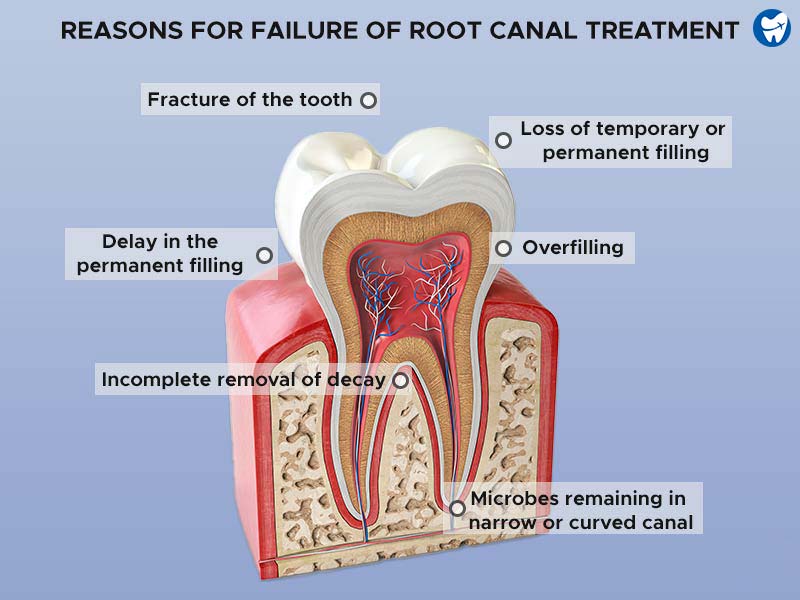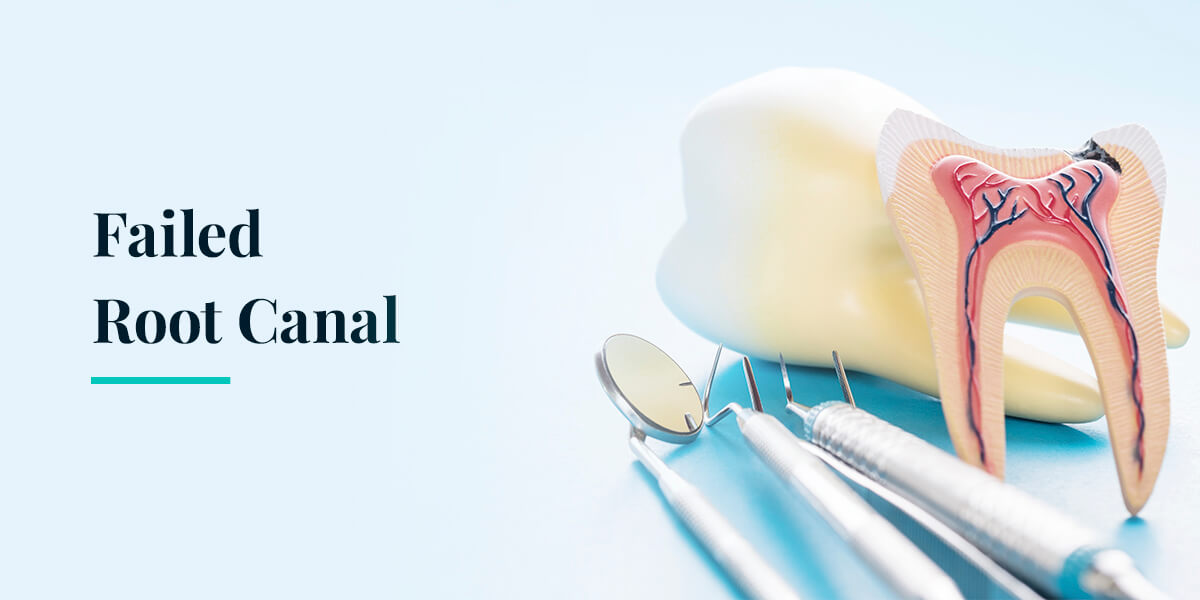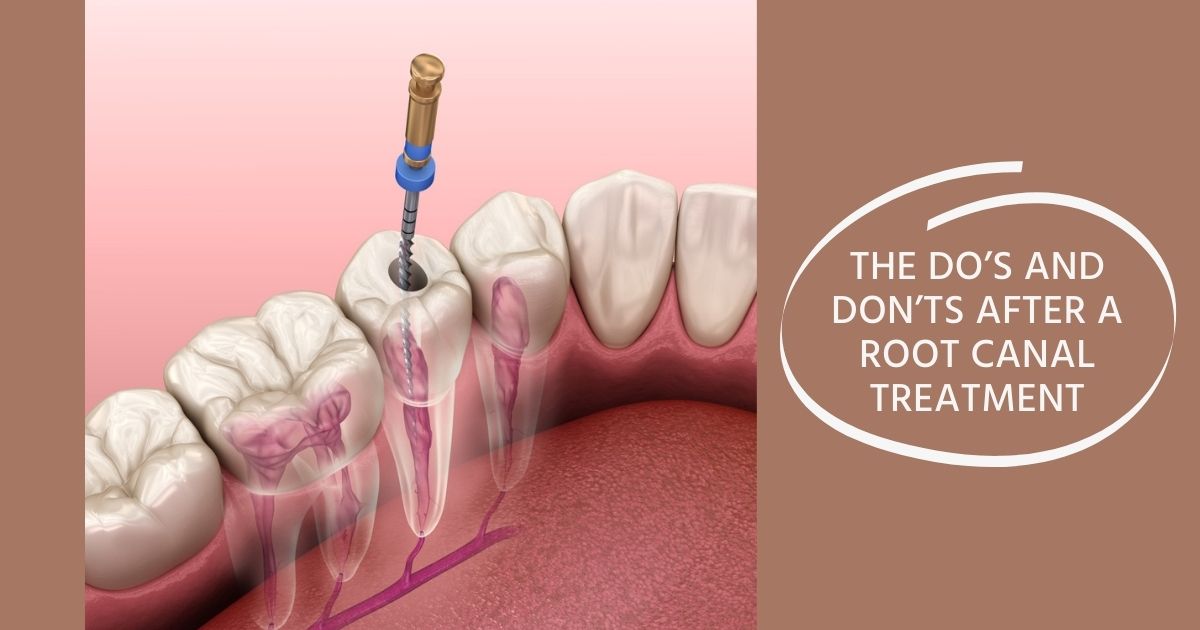Whenever possible, it is best to save your natural tooth. Retreated teeth can function well for years, even for a lifetime. Advances in technology are constantly changing the way root canal treatment is performed, so your endodontist may use new techniques that were not available when you had your first procedure.The signs of a root canal failure may include:
Tooth sensitivity or root canal pain when biting down.
A pimple or boil on the jaw.
Discoloration of the tooth.
Pain from pressure in tooth with root canal.
Tenderness in the gum tissue near where the root canal was performed.
Pain in the tooth you had treated.
Yes, a root canal that has failed can be repaired. Retreatment, extraction along with a Dental Implant, and apicoectomy are all choices available to your endodontist. Retreatment, the most common treatment option for failed root canals, offers the best success rate.
How many times can a root canal be retreated : How Many Times Can You Get A Root Canal Procedure On The Same Tooth A dentist can repeat a root canal treatment on a tooth two or more times. While teeth that undergo a root canal procedure can last a lifetime, some of these teeth may not heal properly due to salivary contamination and other reasons.
Is it better to redo a root canal or extraction
The benefits of endodontic retreatment
Endodontic retreatment has been shown to restore teeth to their normal level of function, while tooth extraction may leave patients with food restrictions. It is possible for teeth that have been restored to work for many years, perhaps even for a lifetime.
Why does my 20 year old root canal hurt : Reasons for Pain Years Later Following a Root Canal
Sometimes a tooth does not fully heal, and the infection returns later. Cleaning the infection from curved canals in tooth roots can be difficult for a dentist. If the infection persists, the tooth will become problematic in the future.
Yes, in some cases you can sue your dentist for a bad root canal treatment if the procedure was not performed to an acceptable standard, or if your dentist neglected their duty of care, resulting in unnecessary pain, harm and suffering. Root canal reinfection isn't common, but it isn't unheard of either. Root canal procedures are overwhelmingly successful; however, a previously treated tooth can become reinfected days, weeks, months, or even years after the initial procedure.
Can a root canal go bad after 20 years
Root canal therapy is generally safe and effective, with a success rate of more than 95%. Like any other medical or dental procedure, though, a root canal can occasionally fail. This is normally due to a loose crown, tooth fracture, or new decay. Root canals can fail soon after the procedure, or even years later.The maxillary molars, especially the second molars, have the most complicated root canal system in permanent dentition. There are many variations in canal number and configuration in maxillary molars. Treatment may be unsuccessful because the dentist may fail to recognize the unusual canal configuration.Direct Pulp Capping
Used to treat severe damage or decay on a tooth that exposes the pulp, this is the number one recommended alternative to root canal procedures by most doctors. This procedure is applied when the pulp exposure is minimal, and there is little to no decay or inflammation. Sensitivity to hot and cold, or lingering pain after consuming hot or cold food. Sharp pain when biting down or when tapping the teeth together. Constant pain and pressure. Swelling of the gums, with or without the presence of a pimple-like bump near the tooth on the gums.
Is a root canal at 25 bad : Patients across many age groups can get root canal therapy as long as they need it. This therapy procedure is often necessary when a person has oral bacteria eroding the pulp of their teeth.
Can antibiotics fix a failed root canal : Although the antibiotics minimize the swelling and the infection, it will not heal the tooth.
Why would an old root canal get infected
Reinfections can occur for several reasons, including a mistake during the initial procedure or a tooth injury years after treatment, but the source always boils down to the presence of bacteria. If bacteria becomes re-colonized within a root canal, then re-infection can occur. Root canal therapy is recommended when teeth can be saved with treatment, while an extraction is performed when the tooth's structure is too damaged, or a crack goes beneath the gum's surface, not leaving enough structure for stability or use after the repair.Out of 250 teeth, a higher percentage of failure was noted in molars (67.6%), followed by premolars (14.0%), incisors (12.8%), and the least in canine (5.6%). The study exhibited multi-rooted teeth with a maximum percentage (74.4%) of failure than those with single roots (25.6%).
What is the new procedure instead of a root canal : The GentleWave® Procedure is a minimally invasive alternative to standard root canal treatment. The innovative procedure utilizes Multisonic Ultracleaning® technology, which enables procedure fluids to reach through the entire root canal system,1 providing efficient cleaning of the complex root canal anatomies.
Antwort Why do root canals fail after 10 years? Weitere Antworten – Is it worth retreating a root canal
Whenever possible, it is best to save your natural tooth. Retreated teeth can function well for years, even for a lifetime. Advances in technology are constantly changing the way root canal treatment is performed, so your endodontist may use new techniques that were not available when you had your first procedure.The signs of a root canal failure may include:
Yes, a root canal that has failed can be repaired. Retreatment, extraction along with a Dental Implant, and apicoectomy are all choices available to your endodontist. Retreatment, the most common treatment option for failed root canals, offers the best success rate.

How many times can a root canal be retreated : How Many Times Can You Get A Root Canal Procedure On The Same Tooth A dentist can repeat a root canal treatment on a tooth two or more times. While teeth that undergo a root canal procedure can last a lifetime, some of these teeth may not heal properly due to salivary contamination and other reasons.
Is it better to redo a root canal or extraction
The benefits of endodontic retreatment
Endodontic retreatment has been shown to restore teeth to their normal level of function, while tooth extraction may leave patients with food restrictions. It is possible for teeth that have been restored to work for many years, perhaps even for a lifetime.
Why does my 20 year old root canal hurt : Reasons for Pain Years Later Following a Root Canal
Sometimes a tooth does not fully heal, and the infection returns later. Cleaning the infection from curved canals in tooth roots can be difficult for a dentist. If the infection persists, the tooth will become problematic in the future.
Yes, in some cases you can sue your dentist for a bad root canal treatment if the procedure was not performed to an acceptable standard, or if your dentist neglected their duty of care, resulting in unnecessary pain, harm and suffering.

Root canal reinfection isn't common, but it isn't unheard of either. Root canal procedures are overwhelmingly successful; however, a previously treated tooth can become reinfected days, weeks, months, or even years after the initial procedure.
Can a root canal go bad after 20 years
Root canal therapy is generally safe and effective, with a success rate of more than 95%. Like any other medical or dental procedure, though, a root canal can occasionally fail. This is normally due to a loose crown, tooth fracture, or new decay. Root canals can fail soon after the procedure, or even years later.The maxillary molars, especially the second molars, have the most complicated root canal system in permanent dentition. There are many variations in canal number and configuration in maxillary molars. Treatment may be unsuccessful because the dentist may fail to recognize the unusual canal configuration.Direct Pulp Capping
Used to treat severe damage or decay on a tooth that exposes the pulp, this is the number one recommended alternative to root canal procedures by most doctors. This procedure is applied when the pulp exposure is minimal, and there is little to no decay or inflammation.

Sensitivity to hot and cold, or lingering pain after consuming hot or cold food. Sharp pain when biting down or when tapping the teeth together. Constant pain and pressure. Swelling of the gums, with or without the presence of a pimple-like bump near the tooth on the gums.
Is a root canal at 25 bad : Patients across many age groups can get root canal therapy as long as they need it. This therapy procedure is often necessary when a person has oral bacteria eroding the pulp of their teeth.
Can antibiotics fix a failed root canal : Although the antibiotics minimize the swelling and the infection, it will not heal the tooth.
Why would an old root canal get infected
Reinfections can occur for several reasons, including a mistake during the initial procedure or a tooth injury years after treatment, but the source always boils down to the presence of bacteria. If bacteria becomes re-colonized within a root canal, then re-infection can occur.

Root canal therapy is recommended when teeth can be saved with treatment, while an extraction is performed when the tooth's structure is too damaged, or a crack goes beneath the gum's surface, not leaving enough structure for stability or use after the repair.Out of 250 teeth, a higher percentage of failure was noted in molars (67.6%), followed by premolars (14.0%), incisors (12.8%), and the least in canine (5.6%). The study exhibited multi-rooted teeth with a maximum percentage (74.4%) of failure than those with single roots (25.6%).
What is the new procedure instead of a root canal : The GentleWave® Procedure is a minimally invasive alternative to standard root canal treatment. The innovative procedure utilizes Multisonic Ultracleaning® technology, which enables procedure fluids to reach through the entire root canal system,1 providing efficient cleaning of the complex root canal anatomies.